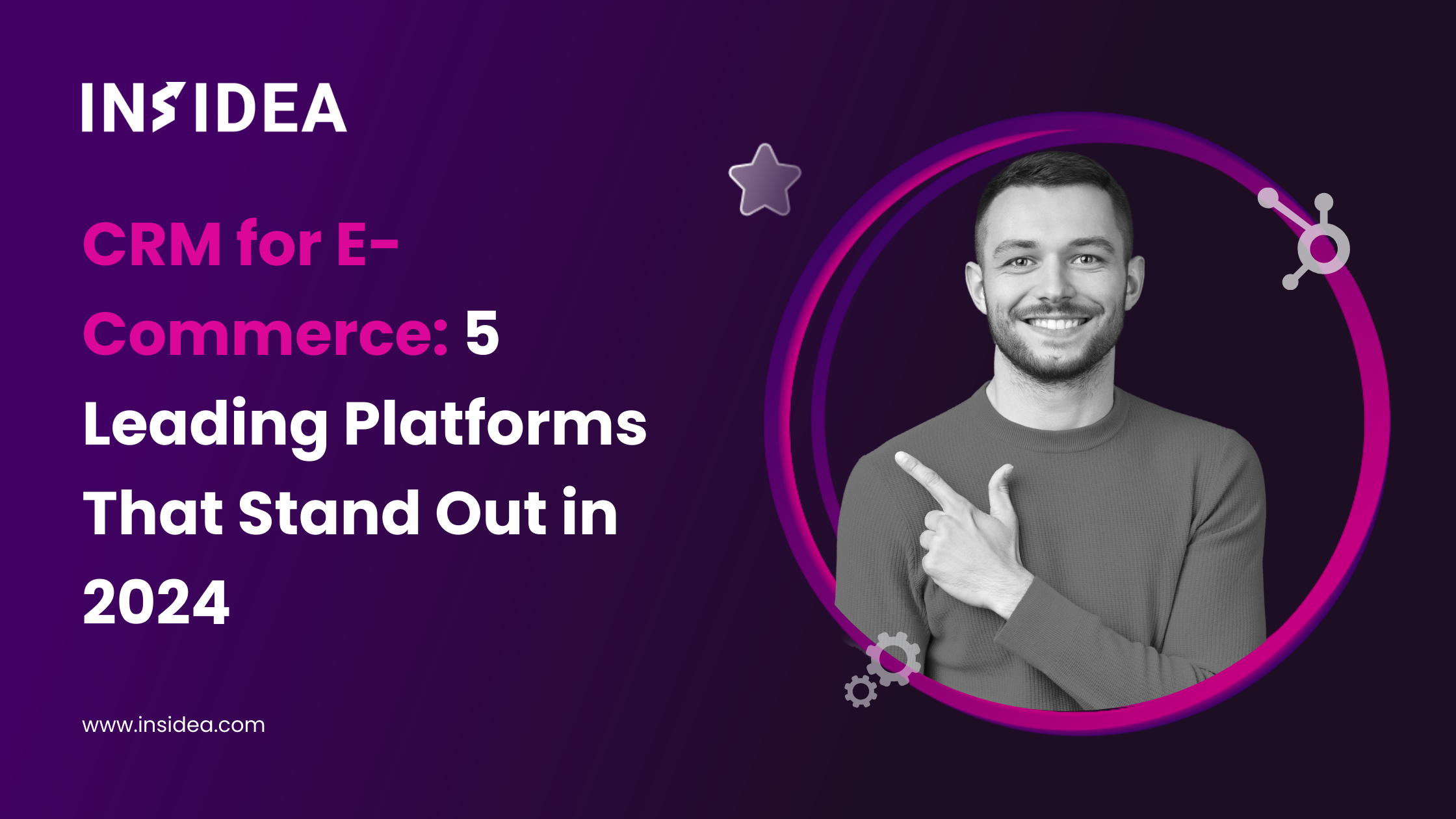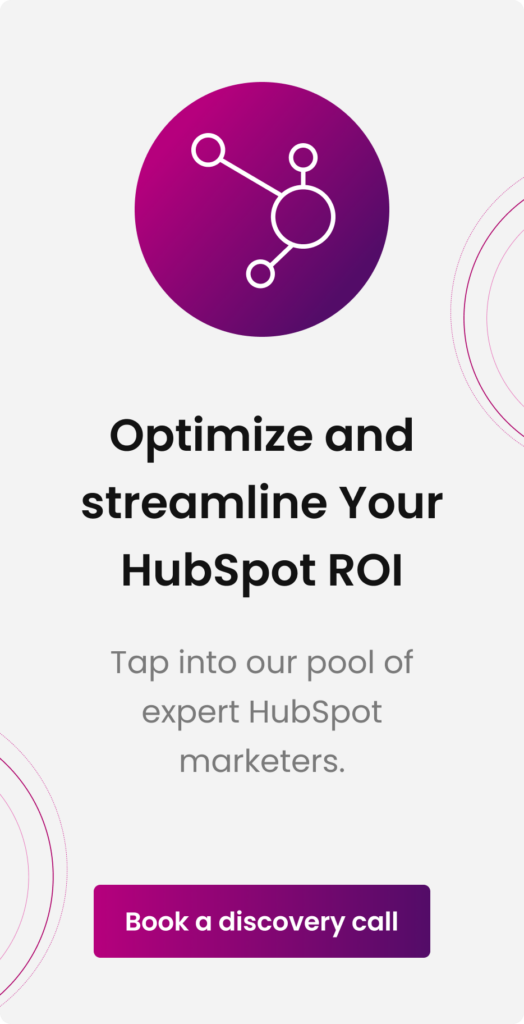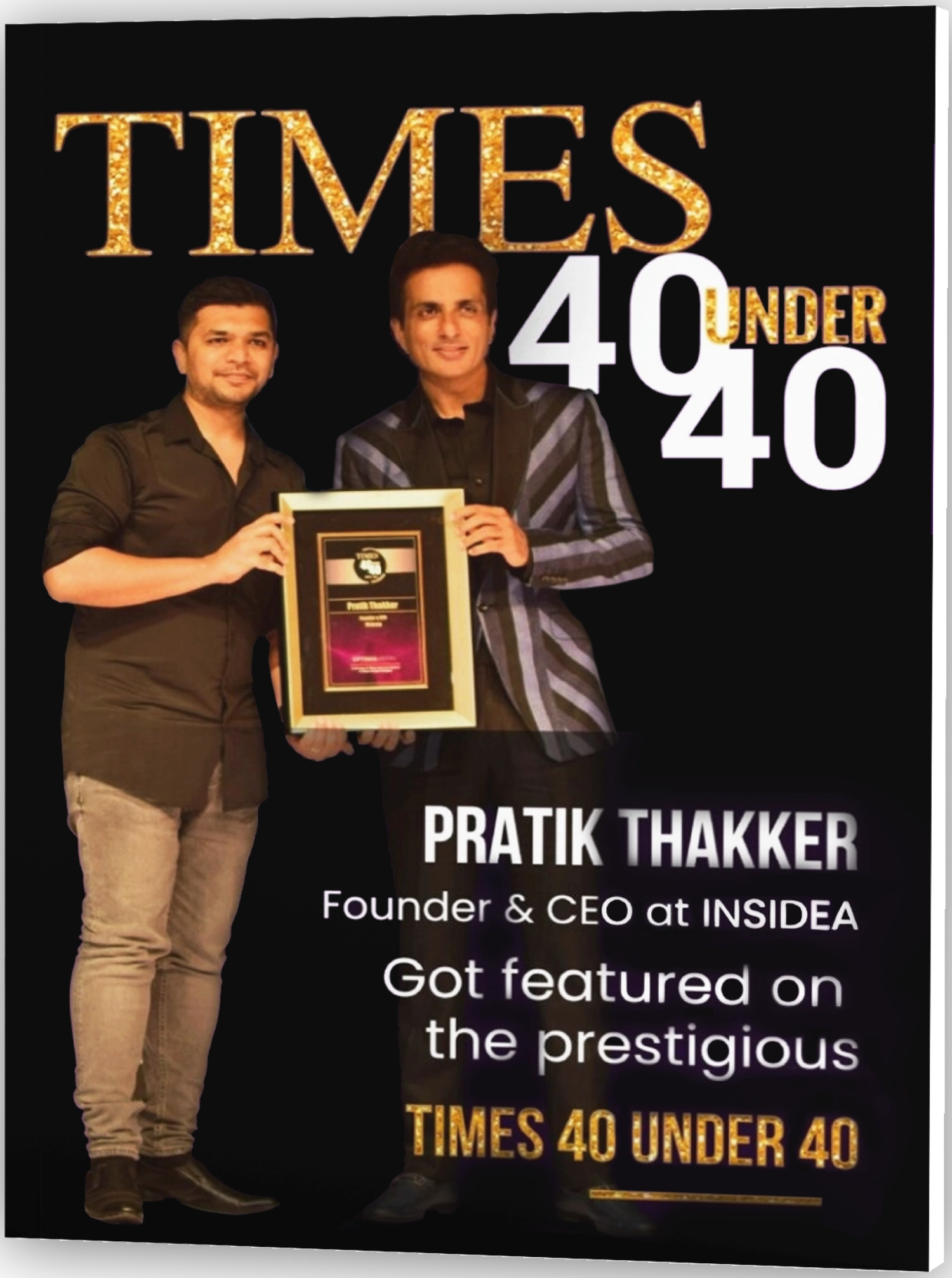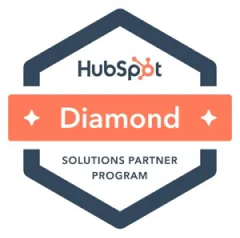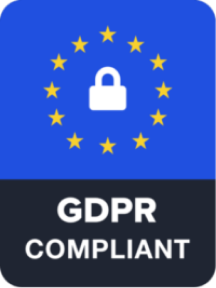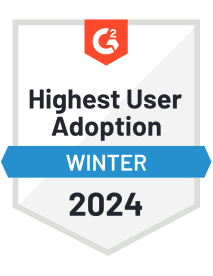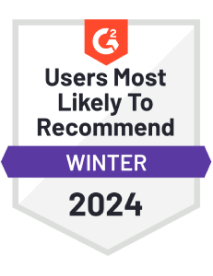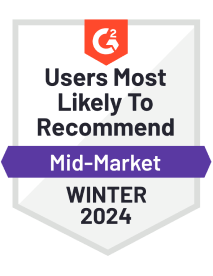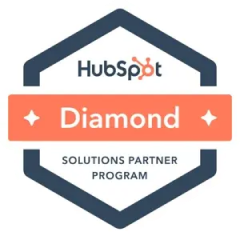In the dynamic world of e-commerce, staying ahead of the competition is not just an option—it’s a necessity. As you embark on your retail journey, understanding and implementing an effective customer relationship management (CRM) system becomes paramount. But what exactly is a CRM for e-commerce, and how does it revolutionize your online business?
Through this insightful blog, you will discover how a well-tailored CRM for e-commerce can transform your customer interactions, enhance retention strategies, and ultimately lead your business towards unprecedented growth.
Highlighting the top 5 CRM solutions in the market, including a detailed look at HubSpot’s unparalleled offerings, this blog serves as your comprehensive guide to mastering e-commerce with the right CRM strategies.
What is a CRM for E-Commerce?
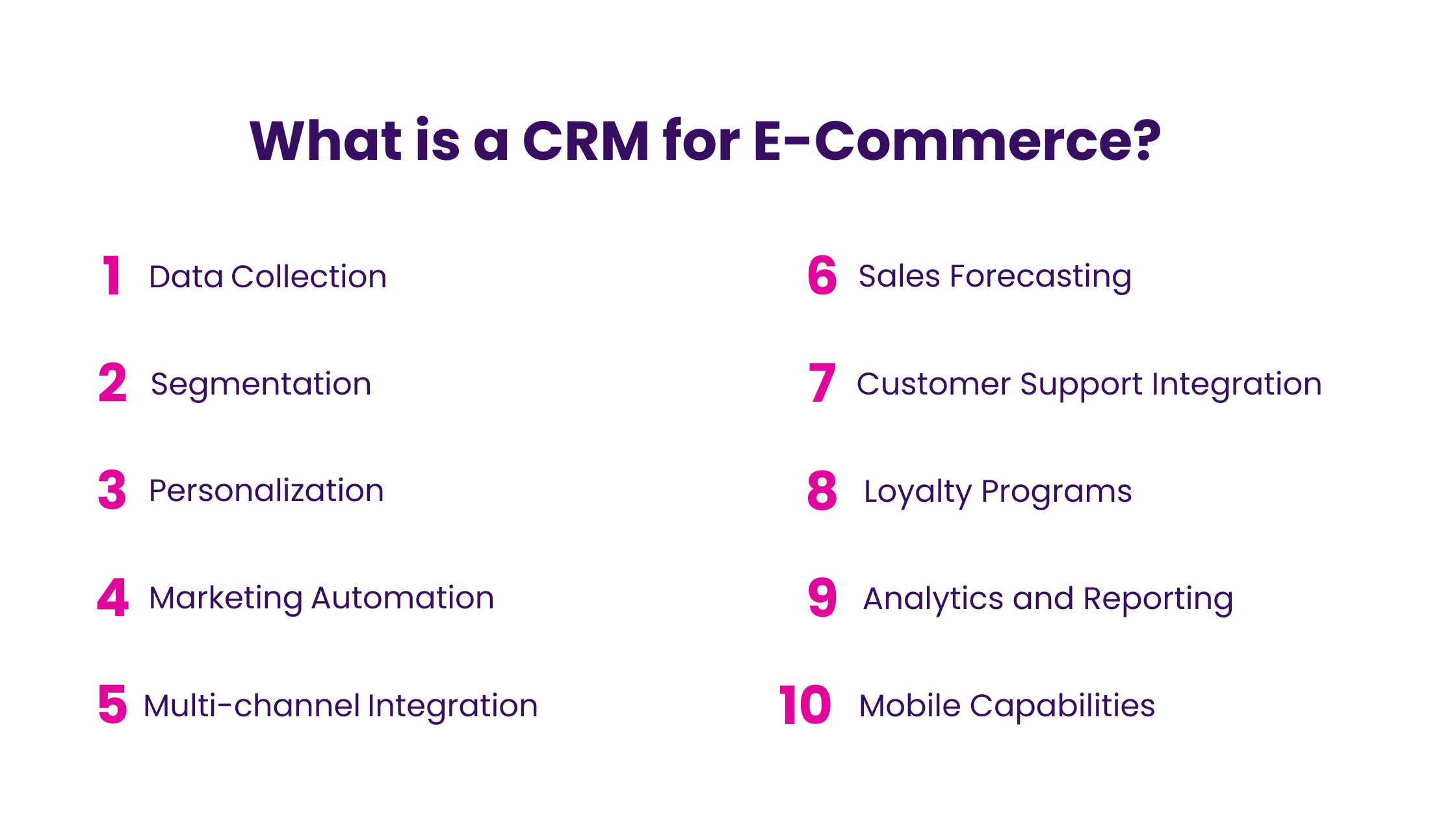
A CRM for e-commerce refers to customer relationship management tools and practices specifically tailored for online retail businesses. While the core principles of CRM remain consistent across industries—managing and analyzing customer interactions to improve relationships and drive sales—e-commerce has unique needs and challenges that require specialized CRM features. Here’s what a CRM for e-commerce typically entails:
1. Data Collection
E-commerce CRMs can automatically gather and store data from every customer interaction on the online store. This includes purchase history, browsing behavior, product preferences, and more.
2. Segmentation
Based on the collected data, businesses can segment their customers into specific groups. For instance, one could segment customers who’ve purchased in the last month, abandoned their shopping carts, or shown interest in a particular product category.
3. Personalization
Using data and segmentation, e-commerce businesses can offer personalized shopping experiences. This might mean showing product recommendations based on browsing history or sending targeted email campaigns.
4. Marketing Automation
E-commerce CRMs often come with tools that automate marketing tasks. For example, they might automatically email customers who’ve abandoned their cart, offering a discount to encourage them to complete the purchase.
5. Multi-channel Integration
E-commerce businesses often interact with customers across multiple channels, from the main website and email to social media platforms and even physical stores. A good e-commerce CRM integrates data from all these channels to provide a unified view of each customer.
6. Sales Forecasting
By analyzing past sales data and current market trends, e-commerce CRMs can help businesses predict future sales, allowing them to manage inventory and marketing efforts more effectively.
7. Customer Support Integration
Many e-commerce CRMs integrate with customer support tools, ensuring that all customer interactions, whether sales or support-related, are stored in one place.
8. Loyalty Programs
Some CRMs offer features to manage and track customer loyalty programs, ensuring loyal customers are rewarded and encouraged to continue shopping.
9. Analytics and Reporting
E-commerce businesses thrive on data. CRMs provide detailed analytics on sales, customer behavior, campaign effectiveness, and more, helping businesses make informed decisions.
10. Mobile Capabilities
Given the rise of mobile shopping, many e-commerce CRMs offer mobile features, ensuring businesses can engage with customers effectively on mobile devices.
How is a CRM For E-Commerce Different From a Traditional CRM?
Traditional CRM software’s principal function is to record and store critical customer information (such as preferred contact method, account information, and possible customer leads) in one place. Using traditional CRM software in daily operations is advantageous since it teaches firms how to effectively communicate with their consumers and meet their needs.
A traditional CRM’s primary purpose is to unite staff and customers by ensuring everyone gets what they need. Finally, a typical CRM offers salespeople a customer profile with information on previous purchases and outreach history.
An e-commerce CRM mainly concerns online sales and customer interactions. Like a traditional CRM, E-CRM can evaluate customer information and sales patterns and capture and store data; however, it can do so all day, every day. Most e-CRM software may also evaluate your website’s metrics, such as:
- Rate of conversion;
- Rate of customer click-through;
- Opt-in for email subscriptions
- Which products are of interest to customers?
This simple e-commerce add-on is intended to give customers individualized experiences. Allowing your consumers to personalize their e-commerce experience, listening to their wants, and making them feel heard are just a few pointers to keep in mind while striving to establish client connections.
The Benefits of Having a CRM for E-Commerce
Integrating a CRM tool into your e-commerce site allows you to collect data on all client interactions on your website and social media platforms to instantly deliver customized offers, access current customer information, and follow each customer’s trip through the sales funnel.
- Increase your marketing and advertising efforts.
- Improved sales team performance
- Encourage collaboration.
- Increase the quality of the customer experience.
- More accurate inventory planning and forecasting.
- Reduces losses and expenditures.
- Gain a competitive advantage.
- Improve your email marketing.
- CRM reporting can aid your approach.
Steps to Choose the Right CRM for Your E-Commerce Business
In the fast-paced world of e-commerce, managing customer interactions effectively is crucial. A good customer relationship management (CRM) system can make this easier, helping businesses improve the shopping experience and boost sales. But with so many CRM options, how do you pick the right one for your online store? This article will explain the steps to help you make an informed choice.
1. Define Your Business Needs
Understand the unique requirements of your e-commerce business. List specific challenges you aim to address with a CRM, such as cart abandonment, customer segmentation, or sales forecasting.
2. Prioritize Must-have Features
Identify the essential features your e-commerce business can only do with. This could be multi-channel integration, marketing automation, or analytics. Differentiate between “nice-to-have” and “must-have” features.
3. Consider Integration Capabilities
Ensure the CRM seamlessly integrates with your existing e-commerce platform, payment gateways, and other tools. Highlight the importance of data synchronization across platforms for a unified customer view.
4. Evaluate User Experience
Opt for a CRM that’s user-friendly and requires minimal training. Consider the learning curve for your team and the overall intuitiveness of the platform.
5. Check Mobile Capabilities
Given the rise of mobile shopping, ensure that CRM offers robust mobile features. Look for mobile-responsive designs and features tailored for mobile users.
6. Assess Scalability
Choose a CRM that can grow with your business. Ensure it can handle increased data and users as your e-commerce business expands.
7. Read Reviews and Seek Recommendations
Look for reviews from other e-commerce businesses of similar size or industry. Seek recommendations from peers or industry experts.
8. Have a Demo or Trial
Take advantage of demo versions or trial periods before finalizing. Use this time to test the CRM’s features, interface, and compatibility with your business processes.
9. Consider Cost and ROI
While cost is a factor, focus on the potential return on investment. Evaluate the CRM’s pricing structure, any hidden costs, and the value it brings in terms of improved sales and customer relationships.
5 Best CRM Software for E-Commerce
Here, we delve into the 5 best CRM software for e-commerce, emphasizing their essential features and advantages.
I. HubSpot CRM

Image Source: HubSpot
The main features are as follows:
- Email Templates and Tracking: HubSpot CRM helps to utilize shareable sales email templates and track outbound activities.
- Sales Automation: Automate sequences for personalized emails and follow-ups throughout the sales cycle.
- Call Tracking: Prioritize and record sales calls, automatically logging them in the CRM.
- Pricing: Ranges from $45 to $3600 per month, depending on the number of contacts and package features.
II. Salesforce CRM

Image Source: Salesforce
Let’s have a look at the main features:
- Engagement Scoring Dashboard: Salesforce CRM offers insights from email engagement to subscriber retention predictions.
- Comprehensive Customer Tracking: Access detailed customer data, including contact information and communication history.
- Sales and Marketing Pipeline Management: Manage sales, track deals, and target niche audiences effectively.
- Automated Business Processes: Incorporate manual tasks like drafting custom proposals into automated workflows.
- Pricing: Starts at $25 per user per month, with more advanced plans available for larger enterprises.
III. Pipedrive

Image Source: Pipedrive
Here’s a breakdown of the main features:
- Lead Management: Customize pipelines for efficient sales lead management and data extraction.
- Customizable Reports: Tailor sales reports to monitor vital business metrics.
- Email Marketing Tools: Features a user-friendly email builder and segmentation for targeted campaigns.
- Pricing: Begins at $17 per month, scaling up to $92 for the Enterprise plan.
IV. Capsule CRM
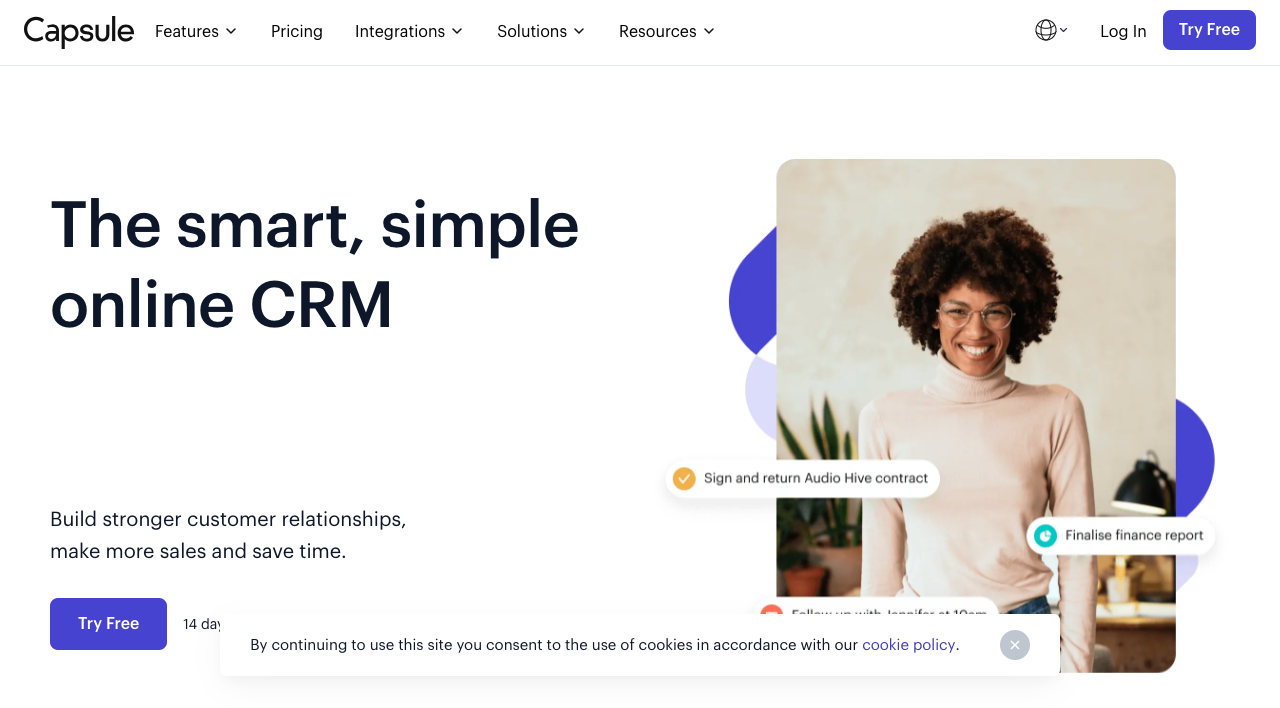
Image Source: Capsule
Let’s consider the main features:
- Contact Management: Offers a complete history of customer interactions and real-time contact syncing.
- Email Marketing Integration: Compatible with Transpond for combined CRM and email marketing functionality.
- Sales Pipeline Visualization: Manage your pipeline with effective visuals and an intuitive interface.
- Pricing: Ranges from $0 to $40 per month, with a 30-day free trial for paid packages.
V. Zoho CRM
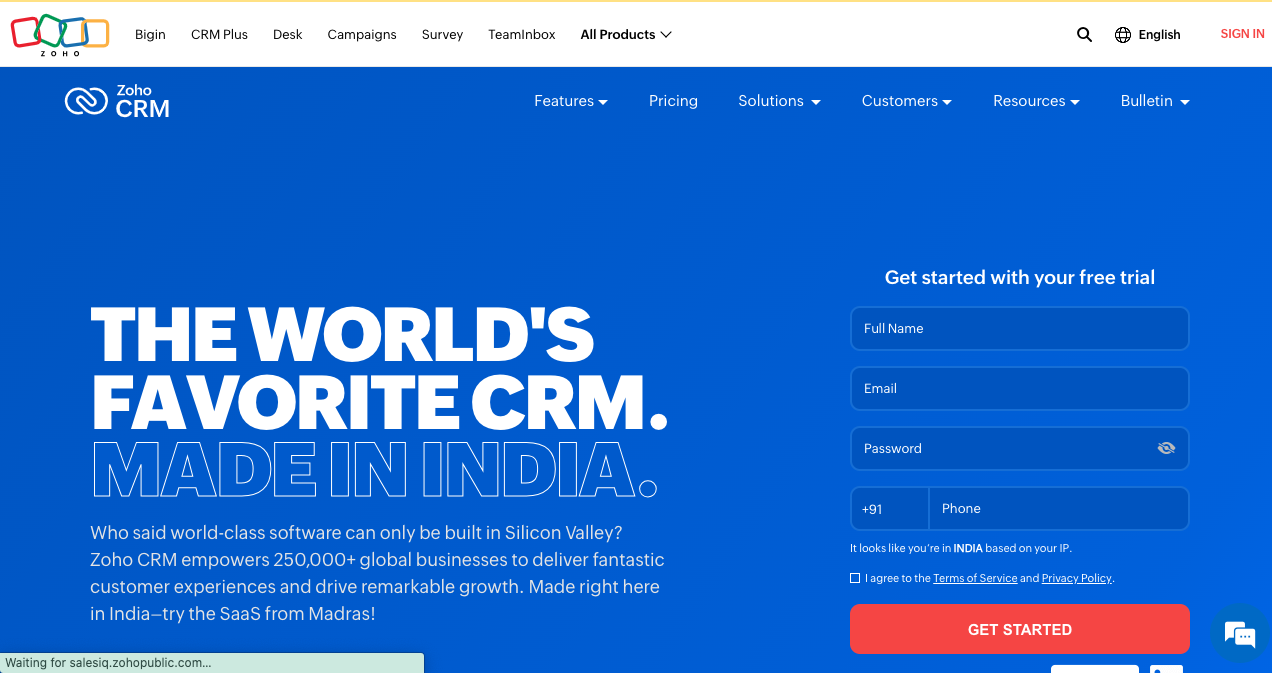
Image Source: Zoho CRM
Here are the main features of the platform:
- Omnichannel Interactions: Centralizes customer information across multiple channels for consistent engagement.
- Sales Enablement Tools: Includes content management tools and strategic planning features.
- Marketing Automation: Automate email campaigns for effective audience segmentation and lead generation.
- In-depth Analytics: Advanced analytics for monitoring the sales cycle and informed decision-making.
- Pricing: Packages range from $14 to $48 per month, with varying trial durations.
Each of the above CRM solutions offers a distinct set of features tailored to the needs of e-commerce businesses. They help in managing customer data, automating marketing efforts, and enhancing customer engagement, ultimately driving sales growth. When choosing a CRM for your e-commerce brand, consider factors like usability, feature set, integration capabilities, and pricing to ensure the best fit for your business needs.
Now, speaking of CRM for e-commerce, let’s talk a bit more about HubSpot. It is known for its flexibility and adaptability to any sector’s requirements. This means HubSpot has an easy-to-use design and specialized features for all marketing needs.
Let’s look at what HubSpot offers as a CRM for e-commerce in the coming section.
How can HubSpot be the Right CRM for E-Commerce?
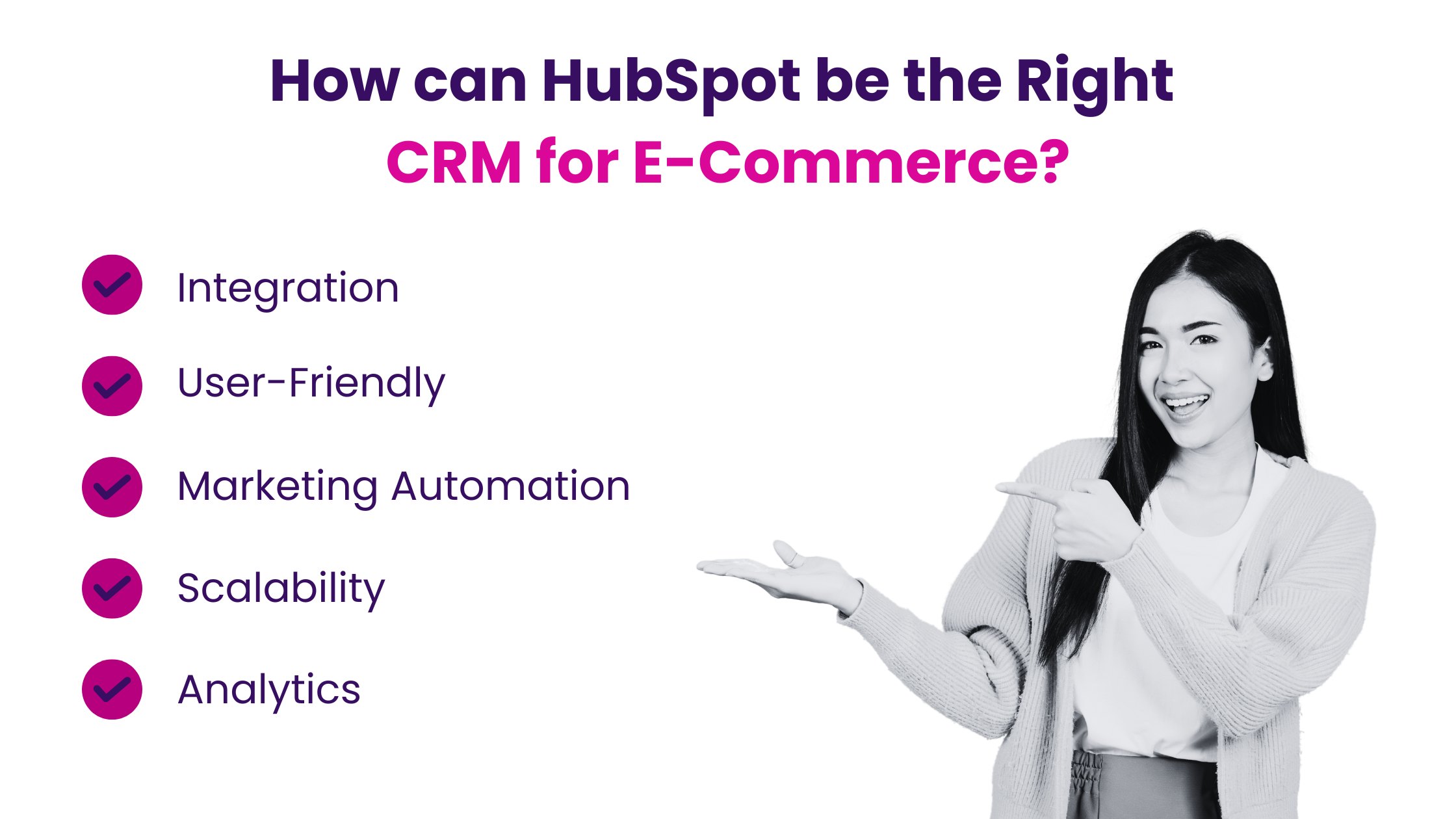
Selecting the right CRM is crucial for e-commerce success. It’s about enhancing customer relationships and boosting sales. HubSpot stands out as a top choice for e-commerce businesses, and here’s why:
- Integration: Easily syncs with popular e-commerce platforms, ensuring a seamless data flow.
- User-Friendly: Its intuitive design means quick onboarding and efficient use, saving time and resources.
- Marketing Automation: HubSpot offers tools to automate email campaigns, track customer behavior, and more, making marketing efforts more effective.
- Scalability: As your business grows, HubSpot grows with you, adapting to your changing needs.
- Analytics: Get insights into sales, customer behavior, and campaign performance, helping you make informed decisions.
Unlock Your Business Potential With Expert HubSpot Support!
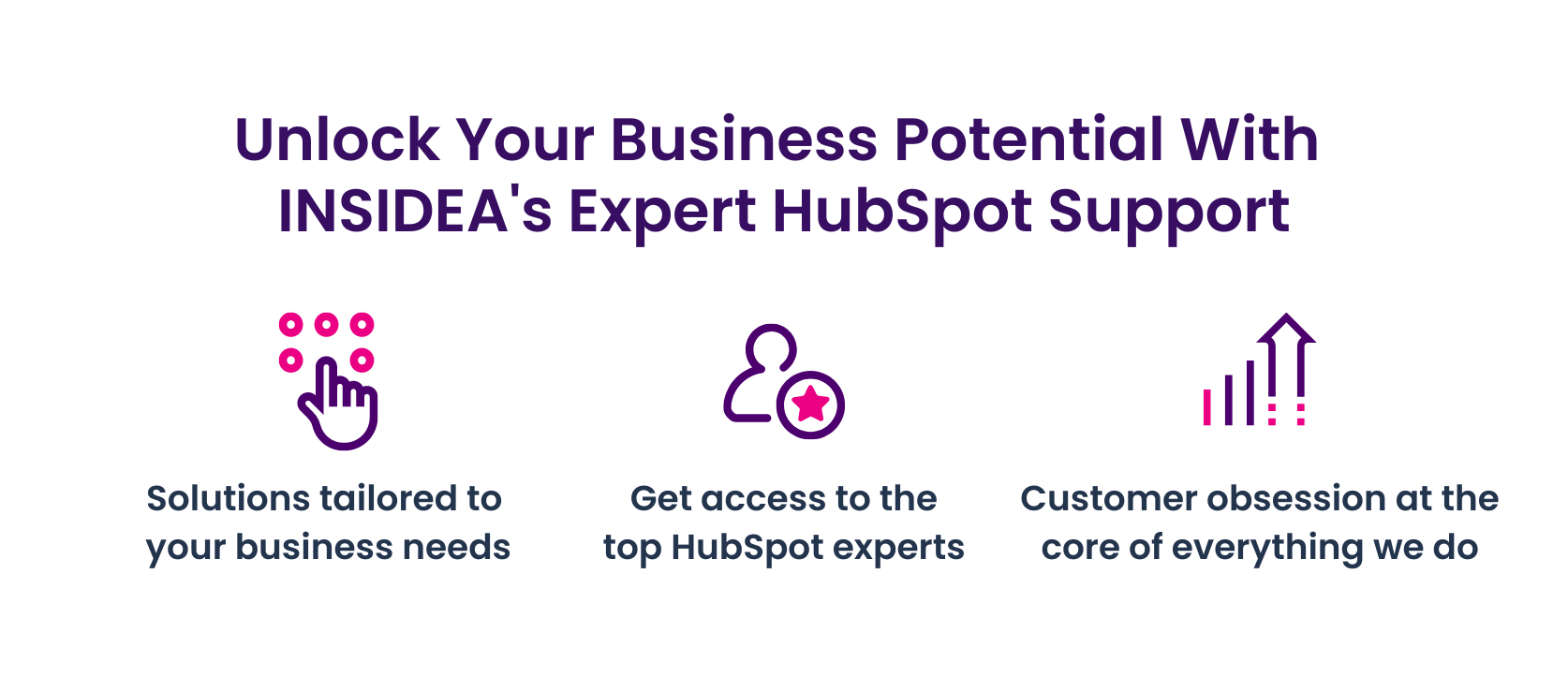
As a HubSpot Solutions Partner we take pride in assisting you with streamlining your HubSpot efforts. With our best-in-class marketing, sales, and service solutions, we help you scale exponentially. INSIDEA’s HubSpot Specialists have the required in-depth knowledge and can provide you with expert guidance on how to use the platform to meet your specific business needs.
Get in touch today to learn more about how INSIDEA can help you succeed!
- Tailored Experience: For us, user experience is the primary focus. Thus, INSIDEA works with you to ensure your HubSpot experience is tailored to your business needs.
- Industry Expertise: Our team specializes in the setup, implementation, and optimization of HubSpot tools, as well as being well-versed in HubSpot best practices to ensure your business has the highest ROI possible.
- Customer Obsession: For us, customer satisfaction is the key to success, and we strive to ensure that our customers’ needs are not only met but exceeded every time.
At INSIDEA, we understand the importance of valuable HubSpot strategies that understand your target audience and drive conversions. Book a meeting with our experts to explore how we can help you with your upcoming projects.




